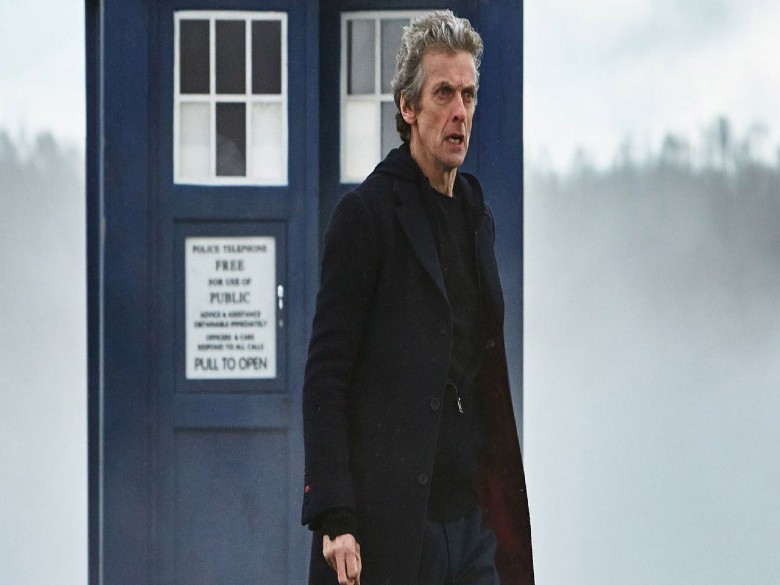Christians, we are people of mercy. We don’t have enemies.
I’m a huge nerd and I love the British sci-fi/fantasy series Doctor Who. In one episode, the Doctor, a time-and-space traveler from the planet Gallifrey, encounters a war-torn planet. It is obvious that this war has been going on for generations as he walks about the planet; the weaponry and armor becomes progressively more technologically sophisticated as he walks along. He stumbles upon a minefield, and in the middle of that minefield is a terrified young boy. The Doctor calls out to the young boy, assuring him that everything will be OK. He asks the boy what his name is. The boy answers, “Davros,” the name of the Doctor’s greatest enemy, the creator of the genocidal cyborgs the Daleks, the creatures that led to the extinction of the Doctor’s people, the Time Lords.
The Doctor freezes. He is not sure what to do. This child will grow up to unleash horror and death on the entire universe. This child will grow up to be his greatest enemy and the greatest enemy to his people. The Doctor leaves the child, seemingly to his fate.
But after some time and some travels (and some time travels), including an encounter with an aged and dying Davros, who once again tries to kill him, the Doctor returns to the young boy Davros. Somewhere in his travels the Doctor has had an epiphany. Davros, a child who has grown up knowing nothing but war, asks the Doctor if he is the enemy. His enemy. The Doctor’s reply is beautiful: “I’m not sure any of that matters. Friends, enemies. So long as there’s mercy. Always mercy.” He rescues the boy from the minefield and walks hand in hand with the boy who would grow up to a genocidal maniac and his worst enemy back to his time-and-space machine, the TARDIS. If you have followed along with this timey-wimeyness, pat yourself on the back. Long story short: the Doctor rescued his greatest enemy because of mercy.

Have Mercy!
Mercy eliminates the distinction we make between friend and enemy. Someone can make themselves my enemy but that does not force me to make them mine. I can still choose to love an enemy like I would love a friend. We call that mercy.
Christians are called to mercy. We are called to love our enemies. This is rooted in the very nature and character of God. We, sinful humans, made ourselves God’s enemies. If God did not love his enemies, he would have nobody else to love. God loved us while we were still sinners, demonstrating this through Jesus’ death on the cross (Romans 5:8).
Jesus commanded his followers to love their enemies. If someone slaps you on one side of the face, turn your other cheek to him so he can slap that one, too. If a Roman solider compels you to carry his gear for a mile, go two. If someone tries to steal your coat, give him the shirt off your back as well. If someone is persecuting you, pray for him. Mercy is central to Christian ethics, to the way we treat others, especially those who mistreat us.
No, Seriously, Please Have Mercy!
Yet far too many Christians who are given far too large a platform are getting way too comfortable with denying mercy to those who would oppose us. There are many self-professed believers going around online and writing books saying that Christians need to be ready to take up arms against their enemies. Christian men need to be capable of violence for the sake of protecting themselves and other Christians. The time for taking up arms against “them” is coming soon. I would link to these fools, but knowledge of their existence has not made my life better, and I would hate to make your life worse for knowing of them.
These sentiments are not just un-Christian, they are anti-Christian. They go against the nature and character of God by denying mercy to people to whom God would grant mercy. They ignore Jesus’ example and his ethical teachings. Jesus died for “them” just as much as he died for us. Jesus has commanded us to show mercy to those who oppose us, not to take up arms against them.
There are several reasons why we should take seriously Christ’s command to love our enemies, to forgive those who wrong us, to pray for those who persecute us.
We are Like Them. They are Like Us.
First, we are more like them than some might care to admit. Sure, it might be very easy to make a sharp distinction between Christians and non-Christians, especially those non-Christians who are hostile to our faith. Our tribalistic nature often demands we form in-groups and out-groups. It’s only natural. We love people who love us. We don’t particularly care for people who don’t.
Now group identity is a helpful thing. It helps us understand who we are and what we do, what is right and what is wrong. And yes, Christians have a group identity. However, we must remember that before we are Christians (or Jews or Muslims or Hindus, etc.) we are human beings. Creatures created in the image of our Creator. Part of the Christian group identity should be mercy toward all people regardless of faith.
All people, whether Christian or not, are made in God’s image and have inherent worth and value. So special are those created in God’s image that God goes out of his way to forbid killing another person (Genesis 9:6). We should stand in solidarity with other people because we actually all share a common enemy.
We’ve Been Rescued. They Haven’t Yet.
We are all enslaved by sin and evil. We have all been corrupted by sin and are all under its consequence, which is death. This is why Paul writes in Ephesians 6 that our struggle is not against flesh and blood, but “but against evil rulers and authorities of the unseen world, against mighty powers in this dark world, and against evil spirits in the heavenly places.”
People are not our enemies, Satan and the evil powers at work in this world are the enemies of all people. We should not feel enmity toward those who, under the influence of sin, oppose us. We should feel pity for them. We have been rescued from that life through the grace of God expressed on the cross of Jesus Christ. We have escaped slavery to sin and evil; they haven’t. Yet. Our hope should not be to overcome people oppose us, but to help rescue them from the forces that cause them to oppose us. We can’t do that if we are slapping them back.
The Ministry of Reconciliation
Finally, the sort of thinking that demands we take up arms against human enemies misses the point of the Gospel entirely. We have been reconciled to God through faith in Jesus Christ, whose death destroyed sin’s power to control us and allowed us to be at one with God again. God has now given us the ministry of reconciliation, of helping other people reconcile to God and receive his forgiveness and mercy. Our calling as Christians is not to make life maximally comfortable for ourselves on Earth but to extend to others the salvation that God has given us. We should never see people as our enemy, but as someone created in God’s image, enslaved to sin, and in need of rescue—just like us. We can’t help people reconcile to God and to others if we are shooting them.
Reconciliation means to turn enemies into friends. Declaring someone your enemy and treating them as such does not lead toward reconciliation. It does not bring them closer to us or to God. It pushes them away, it polarizes people from one another. Our job is not to prepare for war against “them” but to humbly serve “them” so that they might be “us.”
N.T. Wright writes “that is our vocation: to be in prayer, at the point where the world is in pain.” We have been rescued from the permanence of pain but the whole world has not yet received that rescue. We stand in solidarity with all human, will all people created in God’s image, against the spiritual powers of this world that seek to destroy us. We stand in solidarity with them so that they might be reconciled to their Creator.
We are Not Pragmatic
This kind of thinking that would lead someone to think violence against a human enemy is right and good comes from a place of pragmatism. The kind of worldview that would lead someone to think that taking up arms to protect yourself, those like you, and your collective interests is steeped in worldly practicality. You know who wasn’t steeped in worldly practicality? Jesus!
Think about it. God’s plan to rescue the nations was not to wage violent warfare but to allow evil to release all of its violent power on Jesus. God’s plan for our salvation was to die. That is the opposite of practical. It is the opposite of pragmatic. It’s darn near nonsensical. It makes no earthly sense. This is why Paul proclaimed that the cross was foolishness to the Greeks. Jesus allowed evil to do its violent thing without returning the violence.
But in doing so, Jesus broke evil’s power. Evil threw all it had at Jesus, including death. Jesus absorbed it all and rose from the grave. But again, this is not practical. This is not sound tactics or strategy. It probably would not get you too much attention or anger up your donor base very much. But it is right and necessary and good. And thank God, for our sakes, that he did it.
Jesus forgave those who killed him on the cross, knowing that they had no idea what they were doing; they were pawns in evil’s war against him. It’s easy to see how the cross shaped Jesus’ ethical commands. We turn the other cheek, walk the extra mile, pray for our persecutors not because it is practical but because Jesus died on the cross for his persecutors and enemies. We show mercy to those who oppose us because Jesus showed mercy to us when we opposed him. It is right and it is beautiful and it is good to show mercy. It is never wrong to show mercy.
It is the height of arrogance to assume that we have a right to defend ourselves violently from our enemies. We forget that we are not saved by any doing of ourselves but merely by God’s grace—the only difference between a Christian and a non-Christian is we have received God’s grace. That possibility is open and available to all—but we can’t pronounce that gracious opportunity to the world if we are readying for war against it.
Mercy. Always Mercy.
The world might make itself our enemy. Groups of people might seek to become our enemies. But we don’t have to respond in kind. We are called to love all people, including those who make themselves our enemies. Because we follow a merciful God, a merciful Savior and are saved only by God’s mercy, we respond to everyone with mercy. Always mercy.











